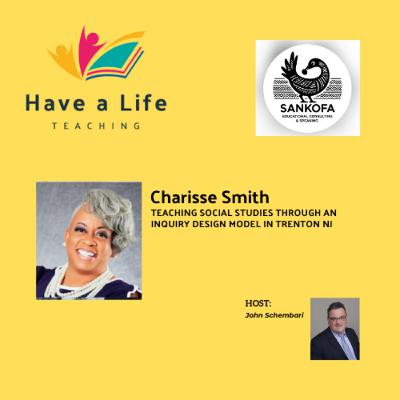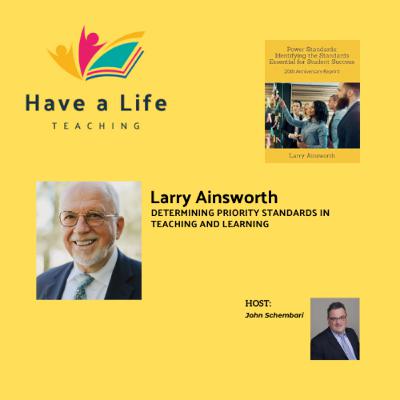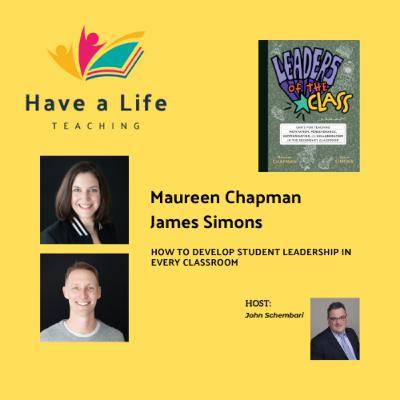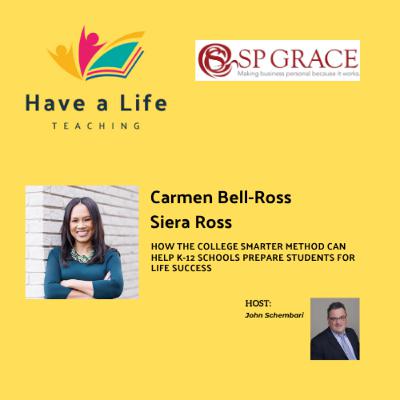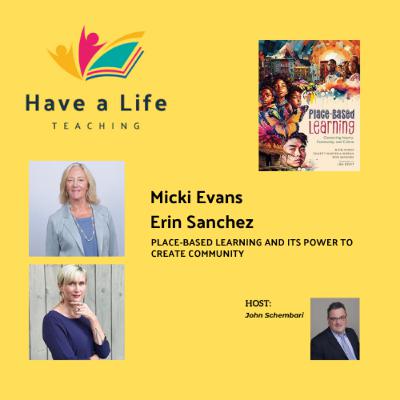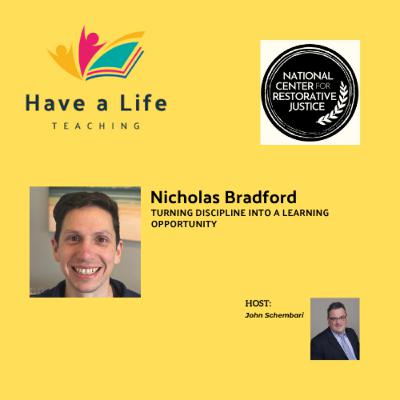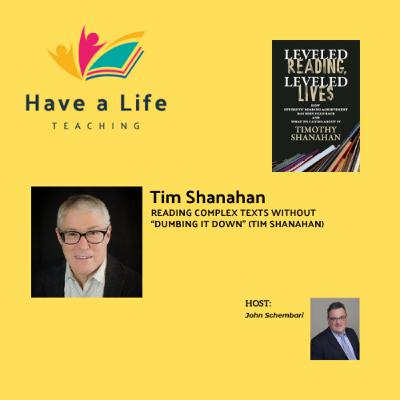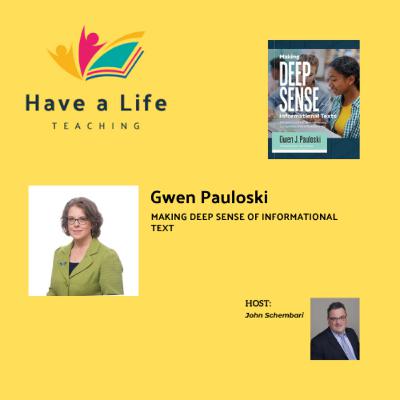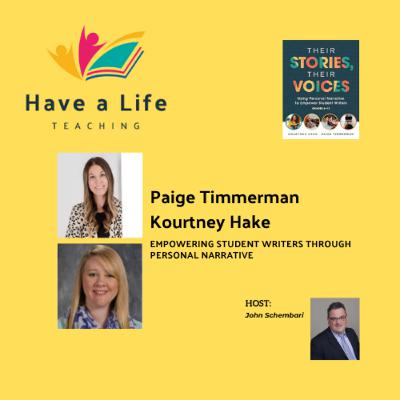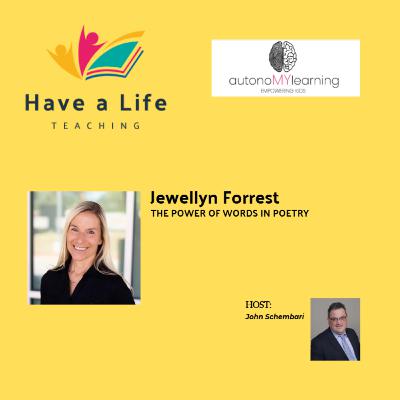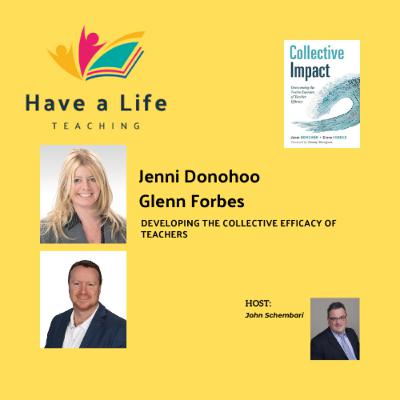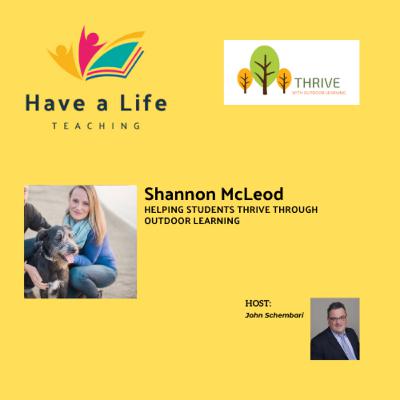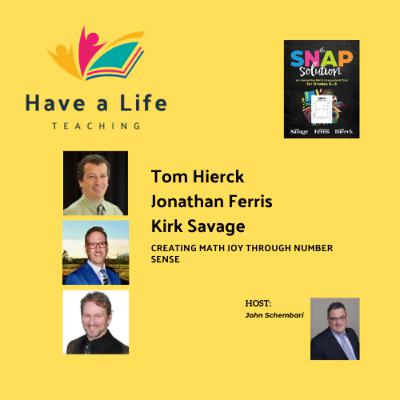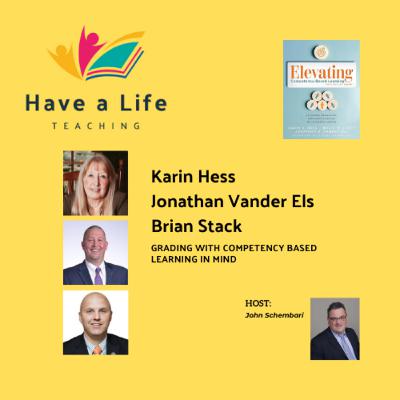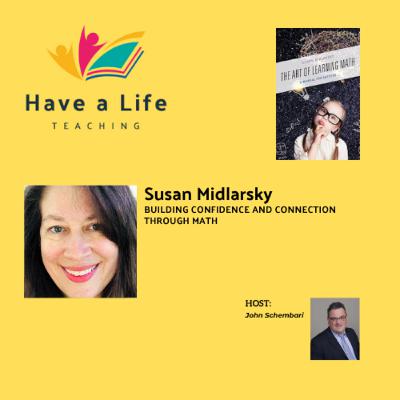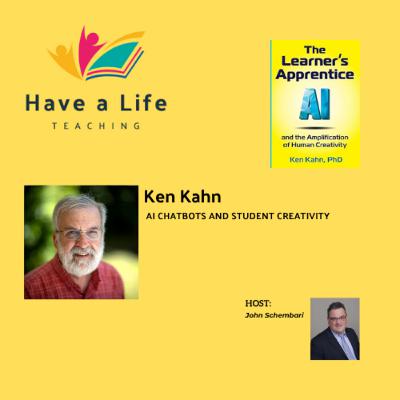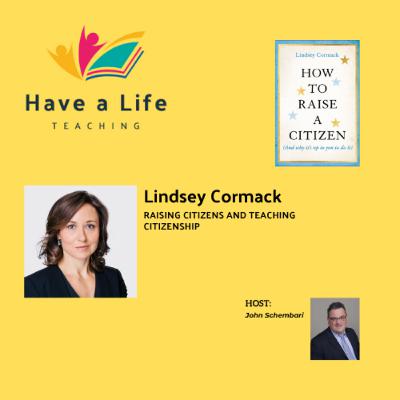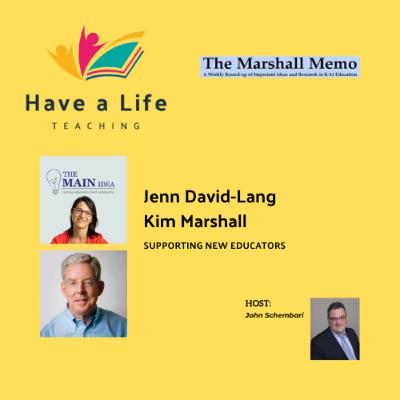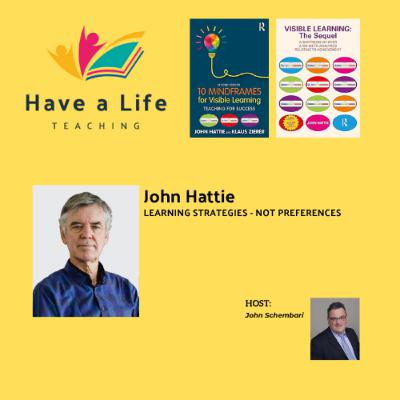Discover Have a Life Teaching
Have a Life Teaching

111 Episodes
Reverse
Making Social Studies Come Alive Through InquiryIn this week’s Podcast episode, I sit down with Charisse Smith Ph.D. —CEO of Sankofa Educational Consulting and former K–6 Social Studies Supervisor in Trenton Public Schools, NJ—to dig into why inquiry-driven social studies is essential for today’s learners.We talk about: ✨ Moving beyond facts + dates to real student thinking ✨ Why elementary students can handle complex history ✨ Powerful examples of informed action (2nd graders contacting City Hall!) ✨ How IDM creates space for civic engagement, critical thinking & SEL ✨ Supporting teachers through the shift from “sage on the stage” to inquiry facilitator/If you want social studies to be relevant, joyful, and transformative, this is the episode.🎧 Listen now and lean into inquiry. Our students—and our democracy—benefit.Charisse Smith LinkedIn PageSankofa Educational Consulting C3 Teachers Blog: Implementing IDMMusic by Aylex
Cutting Through the Noise with Priority StandardsTeachers are asked to do everything — personalization, differentiation, voice and choice, standards-based instruction… but rarely is anything taken off the plate.In this episode of the Podcast, I sit down with Larry Ainsworth, the nationwide expert on unwrapping standards, priority standards, and creating clear learning targets.We dive into: ✨ How to identify what’s truly essential for student learning ✨ The REAL (Readiness, Endurance, Assessment, Leverage) framework ✨ Turning standards into meaningful learning targets & success criteria ✨ Supporting multilingual learners and students with disabilities ✨ Why AI is a tool — not a replacement — for teacher expertise ✨ How schools that prioritize standards see real gains in student achievement.If you’ve ever wondered, “How do I teach what’s essential when everything feels essential?” — this episode is for you.🎧 Listen now and bring clarity back to teaching.Larry Ainsworth LinkedIn PageLarry Ainsworth WebsiteEssential Standards for Multilingual Learners Music by Aylex
In this Have a Life Teaching Podcast episode, we speak with Maureen Chapman and James Simons of Core Creative Partners about their new book, Leaders of the Class. We explore how motivation, perseverance, communication, and collaboration can be intentionally taught alongside academic content—especially at the secondary level.Our guests share powerful stories about helping schools rebuild joy post-pandemic, why adolescents need more opportunities to reflect and lead, and how routines like goal setting, emotional awareness, perseverance strategy banks, and structured collaboration can transform classroom culture.Most importantly, we discuss how this work supports equity, belonging, and agency—ensuring every student, especially those who feel disconnected, develops the skills and confidence to thrive in school and beyond. Core Creative PartnersMaureen Chapman LinkedIn PageJames Simons LinkedIn Page Leaders of the Class Book Music by Aylex
In this episode of the Have a Life Teaching Podcast. we welcome Dr. Carmen Bell Ross—founder and CEO of SP Grace—and her daughter, Sierra Ross, a Harvard University student, for a powerful mother-daughter conversation on helping students not just get into college but thrive once they’re there.Dr. Carmen shares the origins and pillars of her College Smarter Method, a framework that helps students identify their authentic strengths, personal brand, and purpose beyond grades and test scores. She explains how cultivating self-awareness, strategy, and fit empowers young people to stand out in college admissions and future careers.Sierra offers a student’s perspective on discovering her authentic path through STEM exploration, dance, and community service, and how her mother’s guidance helped her connect passion to purpose. She also speaks candidly about confidence, resilience, and self-motivation in college life.Together, they discuss how educators can validate all students’ gifts, ask better questions, and create environments that nurture student agency, reflection, and belonging—especially for diverse learners navigating today’s evolving college landscape.💡 Key Topics:Personal branding and self-discovery for high-school and college studentsThe College Smarter Method and its core pillarsStudent agency, validation, and authentic storytellingBalancing academic rigor with personal passionNavigating college challenges with confidence and purposeVisit CollegeSmarter.com to explore Dr. Carmen Bell Ross’s work and upcoming workshops.Carmen Bell-Ross LinkedIn Page
John talks with Mickey Evans and Erin Sanchez about place-based learning, a pedagogy of connectedness that roots instruction in students’ local communities, cultures, and environments. They share design principles for creating authentic, equitable learning experiences and examples from tribal, rural, and urban schools—showing how community partnerships, storytelling, and student voice transform learning. The episode also explores how AI and VR can expand access and make place-based learning possible anywhere.Defining place-based learning and its equity focusHow to design “learning journeys” that connect culture, inquiry, and communityReal-world examples from schools nationwideOvercoming time and testing pressuresUsing AI and VR to enhance community-connected learningErin Sanchez LinkedInMicki Evans LinkedIn PagePlace Based Learning Book PBL PathMusic by Aylex
In this episode, Dr. John Schembari speaks with Nicholas Bradford - Founder at National Center for Restorative Justice - about how restorative justice can transform school culture by balancing accountability, relationship building, and community repair. Together, they unpack what restorative practices look like in real classrooms and explore how schools can move from punitive discipline models to ones focused on learning, empathy, and responsibility.Redefining Discipline: Moving beyond punishment to accountability and relationship repair.Restorative Practices in Action: How “restorative conferences” differ from traditional discipline and what they look like in schools.Accountability with Compassion: Helping students author responsibility for their actions rather than simply “serve time.”Teacher Reflection: When adults also need to own their actions and model restorative behavior.Building Schoolwide Systems: Starting small with low-hanging fruit—such as relationship-building circles—and scaling to full restorative programs.The Role of Community: Involving students, staff, and parents in a culture of empathy and shared responsibility.Results in Practice: How schools implementing restorative justice have seen significant reductions in suspensions and improvements in climate surveys.“Discipline is choosing what I want most over what I want right now.” — Nicholas BradfordNicholas Bradford LinkedIn PageNational Center for Restorative Justice
Guest:Dr. Tim Shanahan, literacy researcher, author of Leveled Reading, Leveled Lives, and founder of the UIC Center for Literacy.Episode Summary:Dr. Shanahan joins John to discuss why students must engage with grade-level, complex texts—and how teachers can scaffold instruction instead of lowering text difficulty. He explains practical ways to support struggling readers while maintaining rigor and motivation.Key Takeaways:Match instruction—not text level—to student needs.Use rereading, chunking, and guided practice to build comprehension.Pre-teach critical vocabulary and model how to decode complex sentences.Replace “popcorn reading” with safe, paired fluency work.Teach morphology and word structure beyond early grades.Keep students reading on grade level to close, not widen, learning gaps.Leveled Reading, Leveled Lives Book (Harvard Education Press)Blog: Shanahan on LiteracyTim Shanahan LinkedIn PageMusic by Aylex
“If students can’t read to learn, they can’t learn through reading.”In this episode of the podcast, I talk with Gwen Pauloski, author of Making Deep Sense of Informational Text: A Framework for Strengthening Comprehension in Grades 6–12.We dig into why every teacher—not just ELA—needs to see themselves as a literacy teacher. Gwen shares her four pillars for helping adolescents make sense of complex texts: 1️⃣ Rebuilding confidence and “reading esteem” 2️⃣ Teaching comprehension strategies explicitly 3️⃣ Engaging students in scholarly talk 4️⃣ Guiding deep text study through pre-, during-, and post-reading work.We also talk about practical scaffolds like Cornell Notes, annotation strategies, and discussion protocols that keep students thinking deeply instead of skimming for answers.🔗 Listen to the full episode below to hear how you can help students move from “just reading” to truly understanding what they read.Making Deep Sense of Informational Text Gwen Pauloski LinkedIn Page Music by Aylex
In this episode of The Have a Life Teaching Podcast, host Dr. John Schembari talks with Illinois educators Paige Timmerman and Courtney Hake, co-authors of Their Stories, Their Voices. Together, they explore how teachers can use personal narrative writing to help students find and share their authentic voices—while meeting academic standards and preparing for real-world writing.Paige and Courtney discuss how narrative writing builds engagement, supports social-emotional learning, and develops critical thinking. They outline four key narrative types—informative, analytical, persuasive, and reflective—and share practical ways to weave student voice into everyday assignments without overhauling the curriculum. The conversation also dives into innovative projects such as experimental narratives, podcast assignments, and multimedia memoirs that make writing both relevant and joyful.John and his guests unpack how narrative connects to standards, fosters growth mindset, integrates with digital literacy, and even interacts with emerging tools like AI. The episode closes with an inspiring reminder: when students write about what matters to them, they not only learn to communicate—they learn who they are.Paige Timmerman LinkedInKourtney Hake LinkedInTheir Stories Their Voices Book Music by Aylex
Poetry isn’t just “beautiful prose” — it’s a doorway into critical thinking, voice, and perspective.In this episode, I sit down with Jewellyn Forrest, national writing consultant and co-founder of Autonomy Learning, to explore how poetry — and especially figurative language — can: ✔️ Help students “read between the lines” ✔️ Unlock reluctant writers ✔️ Build community and celebrate student voice ✔️ Offer an equity lens by honoring culture and personal experienceJewellyn also shares her powerful Figurative Language Stretch strategy which she wrote about on the ASCD blog — a simple, playful way to help students move from identifying similes and metaphors to confidently weaving them into their own poems.Give it a listen if you’ve ever wondered: How do we get students not only to understand poetry, but to love creating it?Jewellyn Forrest LinkedIn PageAutonoMY Learning WebsiteASCD Blog Post - The Figurative Language StretchMusic by Aylex
When Teachers Believe—in Themselves and Each Other—Students ThriveThis week on the podcast, we sit down with Jenni Donohoo and Glenn Forbes to discuss their new book, Collective Impact: Overcoming the Twelve Enemies of Teacher Efficacy.We explore how collective efficacy—educators’ shared belief in their power to impact student learning—creates school cultures where both teachers and students flourish.Just as we encourage students to see challenges as opportunities, teachers must shift from fixed, demoralized mindsets to one where a small win is celebrated and setbacks fuel growth. Together, educators can—and do—make the difference.- In this episode we highlight John Hattie’s research on collective efficacy as the #1 influence on student achievement.- Explore the authors’ framework of the “12 enemies of efficacy” (from isolation to negativity).- Share practical “micro moves” rooted in Bandura’s four sources of efficacy—mastery, modeling, emotions, and persuasion. Jenni Donohoo LinkedIn PageJenni Donohoo Website Glenn Forbes LinkedIn PageCollective Impact BookSouthern Tioga School District Music by Aylex
In this episode, we are joined by Shannon McLeod from Thrive with Outdoor Learning for an inspiring and insightful conversation about the power of taking learning outside the classroom. We cover the how, why, when, and what of outdoor learning—from practical strategies to deeper reflections on its benefits for students' well-being, engagement, and development.Shannon shares her journey into outdoor education, the philosophy behind her work, and the tangible ways educators can integrate nature into everyday teaching. Whether you're new to outdoor learning or looking to expand your toolkit, this episode offers valuable takeaways and motivation to get outside and make learning come alive.Thrive with Outdoor Learning Website Teach Better Article Pinterest
Our kids are drowning in math failure — and it starts shockingly early. By grade 3, too many students already believe: “I’m just not a math person.”The culprit?Timed tests that reward speed over thinking, worksheets that kill curiosity, and assessments that feel like traps, not opportunities. We’re creating a generation terrified of math.The SNAP Solution flips the script:- Math becomes a puzzle full of wonder- Students show thinking in drawings, equations, and real-life examples- Teachers see true understanding — not test anxietyIf we don’t change math assessment now, the crisis only gets worse.Hear from authors of the book - The SNAP Snapshot - on why SNAP might be the lifeline we need on the most to reinvigorate Math teaching and learning.Tom Hierck LinkedIn Page Jonathan Ferris LinkedIn PageKirk Savage LinkedIn PageThe SNAP Solution Book Music by Aylex
Are we grading what really matters? In most cases, no. In this episode, we sit-down with Karin Hess, Jonathan Vander Els and Brian Stack - authors of the book Elevating Competency-Based Learning in a PLC at Work - to discuss how competency-based learning and grading can help educators provide students with a clear pathway in learning both standards based academic content while developing higher order life skills. We discuss, in particular, how to create classrooms that are student owned, assessment practices beyond the paper and pencil test, and how we can ensure equity in teaching practices across classrooms.Karin l. Hess LinkedIn PageJonathan Vander Els LinkedIn PageBrian Stack Linkedin PageBook - Elevating CompetencyMusic by Aylex
We hope you have enjoyed season two. We will be back with brand new episodes and a third season in August 2025. In the meantime, please feel free to catch up on any of our past episodes. Music - Aylex
In this episode, I talk with educator and author Susan Midlarsky about her book The Art of Learning Math: A Manual for Success. We explore how math can be more than numbers—how it can help students see patterns in life, solve problems creatively, and rebuild confidence after math-related stress or trauma.Susan shares:How recognizing relationships and patterns helps students make sense of math and the worldWays to address math anxiety and trauma with compassion and curiosityThe importance of student-led problem solving over rote memorizationHow connecting math to real life builds confidence and resilienceThis episode is perfect for educators, parents, or anyone looking to make math a more meaningful, empowering experience for learners of all ages.Susan Midlarsky LinkedIn PageBook - The Art of Learning Math HomepageAchieve the Core Coherence Maps Music - Aylex
In this episode of the podcast, we chat with a pioneer in the AI space - Dr. Ken Kahn. Ken walks us through the amazing ways we can increase student creativity through the use of high-powered AI chat bots, not reduce it. We discuss how students can create games and simulations to demonstrate their knowledge of concepts in all core content areas, without needing to know code, as well as ways to create multimodal resources for students (music and images) and choose your own adventure type activities. It truly is a brave new world! Listen in as Ken and I discuss these ideas as well as how his new book can serve as a guide to educators in maximizing the use of AI with students.Ken Kahn LinkedInKen Kahn Book - The Learner's Apprentice Music - Aylex
Drama critic George Jean-Nathan once said that "Bad officials are elected by good citizens who do not vote." Although 47% of all young people eligible to cast a ballot in the 2024 presidential election did so, 53% did not. How did we get here? Professor Lindsey Cormack, author of the book "How to Raise a Citizen" believes that this situation, overall, is the result of a lack of youth awareness of the political and democratic process. So how then can educators, along with parents, teach students what they need to know?In this episode we discuss:- The definition of "citizen". - How teachers can teach the political process through experiential learning.- How we should spiral or build upon learning of the democratic process in each grade not just in middle school or 11th grade government class.- How to turn youth from consumers of information on the Internet to information seekers.- Why adults need to turn down the negativity about politics and teach students how to argue opposing viewpoints with civility. - How teachers can teach the democratic process without falling victim to increasing legal jeopardy when what they teach upsets some parents with strong political views - red or blue. - How parents can and should support the awareness of their children about the democratic process. We hope you will listen in to this important conversation. Lindsey Cormack LinkedIn page Book - How to Raise a Citizen How to Raise a Citizen InstagramHow to Raise a Citizen Webpage James Madison's Montpelier Website Music - Aylex
In this episode of the podcast, we speak with authors Jenn David-Lang, the Main Idea, and Kim Marshall, the Marshall Memo, about their work in curating the "best of" resources available to educators - particularly leaders working with new teachers as well as new teachers interested in self-growth. New teachers need certain supports beyond what David-Lang calls the boiler plate "where are the keys" training all teachers get at the beginning of each year. Marshall and David-Lang offer their suggestions on what this training should look like if we want to retain their talents. The Marshall MemoThe Main IdeaThe Best of the Marshall Memo Music - Aylex
In this latest episode of the Have a Life Teaching Podcast, we chat with education researcher John Hattie - professor at the University of Melbourne. We discuss, despite evidence suggesting it is ineffective, the continued prevalence of the theory of learning styles and preferences and targeting instruction for individual students towards a specific approach such as visual, auditory, verbal, and/or kinesthetic learning. Rather, Hattie suggests that we think in terms of using a variety of learning strategies that evidence suggests are high impact strategies for improving student knowledge and retention of learning:- Organizational strategies- Learning consolidation techniques- Exposed student thinking practicesWe also discuss specific techniques for helping teachers to design lessons that engage students in each of these best learning practices. The Hattie Family Foundation WebsiteLearning Styles, Preferences, Learning Strategies Article Corwin Visible Learning Website Visible Learning: The Sequel Book 10 Mind Frames for Visible Learning Book Music by Aylex


